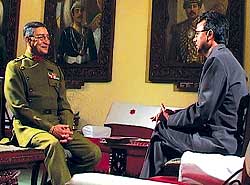 Nepali Times brings the full transcript of the much talked-about interview of Chief of Army Staff Prajwalla SJB Rana by Vijay Kumar broadcast by Nepal Television in its Dishanirdesh programme on Monday, 17 December. The army chief re-iterates that his goal is to disarm the Maoists and bring them back to the negotiating table. He also asks his own questions about the roots of the insurgency, and whether or not the army should have been called out earlier.
Nepali Times brings the full transcript of the much talked-about interview of Chief of Army Staff Prajwalla SJB Rana by Vijay Kumar broadcast by Nepal Television in its Dishanirdesh programme on Monday, 17 December. The army chief re-iterates that his goal is to disarm the Maoists and bring them back to the negotiating table. He also asks his own questions about the roots of the insurgency, and whether or not the army should have been called out earlier.
Vijay Kumar: Now that the RNA is deployed against the Maoists, people say the army should have stepped in earlier?
Prajwalla S Rana: This question is now outdated, because in 1996 terrorist activity was only a spark. Now it has caused massive loss of life and national property. After the RNA analysed the problem, it came to the conclusion that the problem had grown into something that could affect national security and today it has spread like wildfire. That is why we recommended to the government that the ISDP be implemented. If you look at the terrorist problem now, it has spread nationwide. This is why if the army had not been deployed it would have threatened national security. The deployment is constitutional: it was done at the recommendation of the council of ministers, and His Majesty the King, in accordance with the Constitution of Nepal Article 115 (1), declared a state of emergency and we have now been ordered to this task.
Would things have not been as bad if the army had been deployed earlier?
In my view if army had been deployed earlier, this situation may not have come. We have to be deployed in accordance with the constitution. We were deployed under the ISDP to implement development programs and provide security to the citizens. So we moved into several districts, Rolpa, Rukum, Jajarkot, Salyan, Gorkha, etc. We had been deployed for development. Our goal was to win over the hearts and minds of the people and wean them away from the insurgency. But the Maoists attacked us unnecessarily, and we had no other option but to respond and carry out our duties.
So the army deployment under the ISDP was a defensive posture?
That is correct. 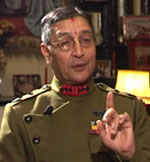 But after their attacks, the army is now also on the offensive. Would it have been easier to control the situation if we had been offensive before?I have already told you that decision is of the government, whether we are to be on the defensive or on the offensive. The army cannot take that decision on its own, based on its assessment, but has to obey the government's orders. They overran the Dang barrack and took our weapons. Now it is our duty to get the weapons back. A soldier loses prestige if he loses his weapons. This is why we had to go on the offensive to retrieve our hardware.
But after their attacks, the army is now also on the offensive. Would it have been easier to control the situation if we had been offensive before?I have already told you that decision is of the government, whether we are to be on the defensive or on the offensive. The army cannot take that decision on its own, based on its assessment, but has to obey the government's orders. They overran the Dang barrack and took our weapons. Now it is our duty to get the weapons back. A soldier loses prestige if he loses his weapons. This is why we had to go on the offensive to retrieve our hardware.
So why did you wait to go on the offensive?
It was the order of the government this time, we were ordered to get back the weapons so we went on the offensive. We did not have a similar order before.
Earlier it was said the army was unwilling to move against the Maoists?
Prajwalla S Rana: That is wrong. I said it yesterday and will repeat: there is a constitutional process for mobilising the army, there is a law. The army has to be deployed under the provisions of the law, that is our
position. The RNA won't be deployed without fulfilling that process.
So it is not true that the army refused deployment?
Not true.
Then why the controversy over that?
The army never stirred that controversy and will not do so. Our position is that we can de deployed legally, and then we will follow the government's orders. That is it.
So the controversy is baseless?
Yes. We have not raised any controversies on our side. If others do that, it is not our problem.
You are trying to say the army was not ordered in this manner before?
Yes. We were not ordered this way. We need mandate from the government in accordance with the constitution, and that mandate is an order based on which we will move forward.
A strictly constitutional (mandate)?
Absolutely. We have to move in accordance with the constitution. Let me explain. If the army is not deployed in that manner, in accordance with the constitution, then there is the danger that we may move on our own. The RNA can even do that but no army in any country can move without constitutional orders. On the other hand, if the army is not legally deployed it could taint both the government and the army which is not in the nation's interest. That is why we say give us an order that is constitutional and we move forward. That is the bottom line.
Sometimes we say "Royal Army", is our army a Royal Army?
I would like to correct this. I have to. This is not a Royal Army but the Royal Nepalese Army. "Royal" is only a title. This is a Nepali army, and by that we mean the army of the state. It is an army for the state, for its security.
What is its mission?
The RNA is not something formed today. The RNA has been around since unification. It was there yesterday, is there today and will be there tomorrow. Many people do not know about the army's tradiiton. If you
read our history, you'll understand our traditional positions. We have to abide by the traditions. What this means is that we have to be deployed constitutionally, there would be controversies the moment we are deployed unconstitutionally which is not in the interest of the nation. The army's concern is not about politics, only national security. 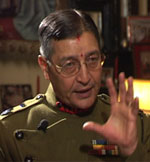 Your concern is that the army has to be deployed constitutionally?
Your concern is that the army has to be deployed constitutionally?
Absolutely.
This is all you want?
Yes. We got a constitutional order and now we are deployed.
Do people in the army have political knowledge?
The RNA will not put its hands into politics because that is not our profession. But because politics is associated with national security, it is important for us to understand politics.
So you understand politics?
Yes, we have to understand it because it is related to national security.
You are aware of what is happening in politics?
Yes we have to know.
Once your are aware aren't you tempted to intervene?
That is not our profession.
How are you tackling the Maoists now?
Based on our orders we are moving ahead successfully, in some areas. In Salleri, Ratamate, Kapurkot, we counter-attacked and we were able to inflict heavy casualties on them. So far we have lost 24 brave men, and 58 have been injured. Our morale is high, and will remain high. Because they are unable to face us, the terrorists have shamelessly targeted our families and families of former servicemen. That is unacceptable to us and it will be very counter-productive to the terrorists if they continue doing that.
How do you feel about fighting a war within the country?
In any country, not only in Nepal, no country likes having to fight its own people. Definitely, our intention is not to kill Nepalis. We were not after the Maoists or their lives, we were engaged in ensuring development. But they attacked us and we had to respond. Our patriotic army will not let those that have committed wrongs to get off lightly.
Why do you think they dared to attack your base in Dang?
I cannot say we did not expect them to attack. Invariably in the army we have various options, and a possible option was an attack. We made a mistake and had to face a reversal in Dang, in other places we are ok.
It was a surprise attack in Dang?
Yes that is correct.
Are there possibilities for another surprise like that?
It will now be difficult for them.
Do you think the terrorists thought they could defeat you like they did to the police?
Possibly.
How do the strengths of the police and army differ?
Our work is different, the police have theirs and we ours. We are trained to fight, police are trained in maintaining law and order. Possibly, they (Maoists) did not understand that the army is unlike the police. They are now seeing the result. 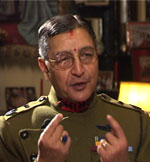 What are the chances of civilians being caught in the crossfire?
What are the chances of civilians being caught in the crossfire?
The army is sensitive about the protection of citizens and their property. That is why we have called on people not to be present in areas where there are Maoist activities. They are using human shields and when we attack some civilians may be harmed, we cannot deny that. In such types of operations there is also a possibility that some physical infrastructures could be damaged. The army has taken measures to avoid such losses and has set up systems to solicit the help of citizens.
What is your report on the reaction in the Maoist camp after the army moved against them?
It is still early in the operations. But we understand that their morale has been affected. If we are able to push harder we could cause greater damage in the long run.
Before the army moved the Maoists were on the offensive and state on the defensive. What is your position now?
After they looted weapons, it has become very necessary to get back the weapons and we have to be offensive to get the weapons back and we are.
Have we recovered some weapons?
Yes, some. Not all. This has been made public.
Are you satisfied with the operation so far?
I am satisfied absolutely, but we are trying to do better.
How long will the operation last?
There won't be a time limit to the operation because of the nature of the terrorist problem and our training, we cannot fix the time for the operation. But if all citizens and army come together and move forward together, this operation could end fast. What I mean is we could use information on the Maoists. If that happens we can intensify our action and try to end this fast.
What type of support are you getting now, from the citizens, politicians, the state?
From government we have very good support. But other departments, if they were as dedicated as we are, it would be better still.
What about the press?
On this, in an emergency the press has a major role. News has to be correct, and if that can be done and the nation informed accordingly it would be good. From our experience we feel some newspapers have been disseminating unnecessary information and confusing the people. If they play a responsible role to inform citizens then the role of the press can be very important in this campaign.
The press has it own problems about information flow from you.
We have not distorted any information we have received in our statements. We have been passing on the news based on facts. For example, our helicopters may have attacked Maoist columns and killed them, but our troops are not on the ground. How can we provide information on their casualties? We cannot provide that information, because of the terrain. Newspapers say this happened in so and so place, it that verifiable or not? We have been giving the information we can give without distortion.
You don't give operational details?
We will not give operation details to anyone. That is a military secret and could be used by the other party against us. Operational details are strictly on a need-to-know basis, even parts of the army will not know what the others are doing. 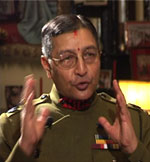 The impression is that the army aloof of national life, what can be the relationship in a healthy democratic system?
The impression is that the army aloof of national life, what can be the relationship in a healthy democratic system?
Frankly, the army has its traditions, beliefs, character and discipline which bind us. We in the Royal Nepal Army haven't intermingled with citizens except in times of natural disasters. That is when we have been directly involved with the problems of national life.
If you need support of all for national security, where does this fit?
I will give you an example. We have a military academy at Kharipati to train officers. In our career structure we found that the education was not uniform and to bring that to one level we tried to bring the education at Kharipati to the Bachelor's level. For that we need affiliation with Tribhuvan University. We requested for that and they said security was not our subject, how could they affiliate us? I told them that national security was the responsibility of every citizen, not just the RNA. We should have a syllabus in every campus and that would help all. They said they had not thought about it this way and gave us the necessary permission.
What I am trying to get at is the thinking of the people, institutions and our culture. All these have made national security the responsibility of only the army. We have to change that. Every individual has a responsibility towards national security.
Does the army have a solution to solve the Maoist problem?
Basically, in every country there are problems. It is necessary to find ways to solve them and there are ways to do so if you try hard. The RNA did not ask for the present situation, and as the prime minister has said: "We won't go to talks until the Maoist terrorists lay down arms." Until that time, the RNA's duty is to create an environment for holding talks.
What type of environment?
We have orders from government to defeat them. Defeating them means killing many Nepalis, which may happen. But before that happens, if the Maoists are smart they will lay down their arms and come to the negotiating table. We may be forced to disarm them and that may get them to the table. If that does not happen, we will be forced to try to defeat them and bring them to the table.
What would you like to happen personally?
I feel Nepalis should not kill Nepalis. The Maoists should realise this, and avoid more Nepali bloodshed. They should peacefully hand over their weapons, and I believe that the government would talk with them if they do that.
Anything else you would like to add?
Before the Maoist problem is resolved, we have to seriously try and find out how this problem emerged. We have to ask: did this situation arise because of the lack of good governance? Our country Nepal, after unification, has never been a colony of any power. It has been a garden of four castes and 36 ethnicities. A visionary king and sacrifices by our brave forefathers made all this possible. In this historical hour all citizens have to gear up for the security of our motherland, to take on national responsibility and move forward. Today we have a question we should all be concerned about: should we Nepalis be united or should we be divisive? I hope all Nepalis get the opportunity to develop in accordance with the values and norms laid down by the Constitution of Nepal, under the able leadership of the symbol of the nation and unity, His Majesty the King. That is what the Nepalis want and is what the Royal Nepal Army believes in. Long live the Nation, long live the Monarch.


